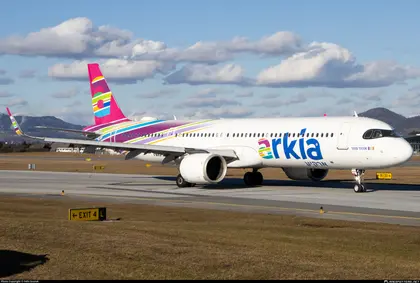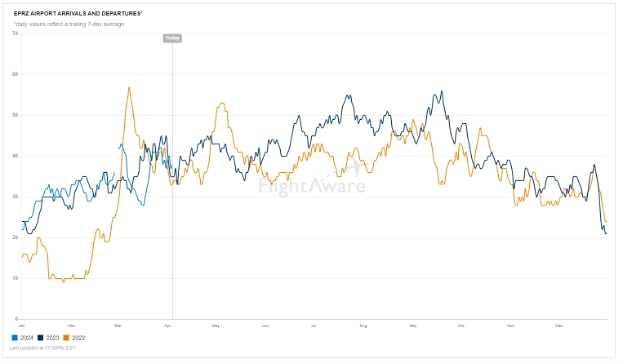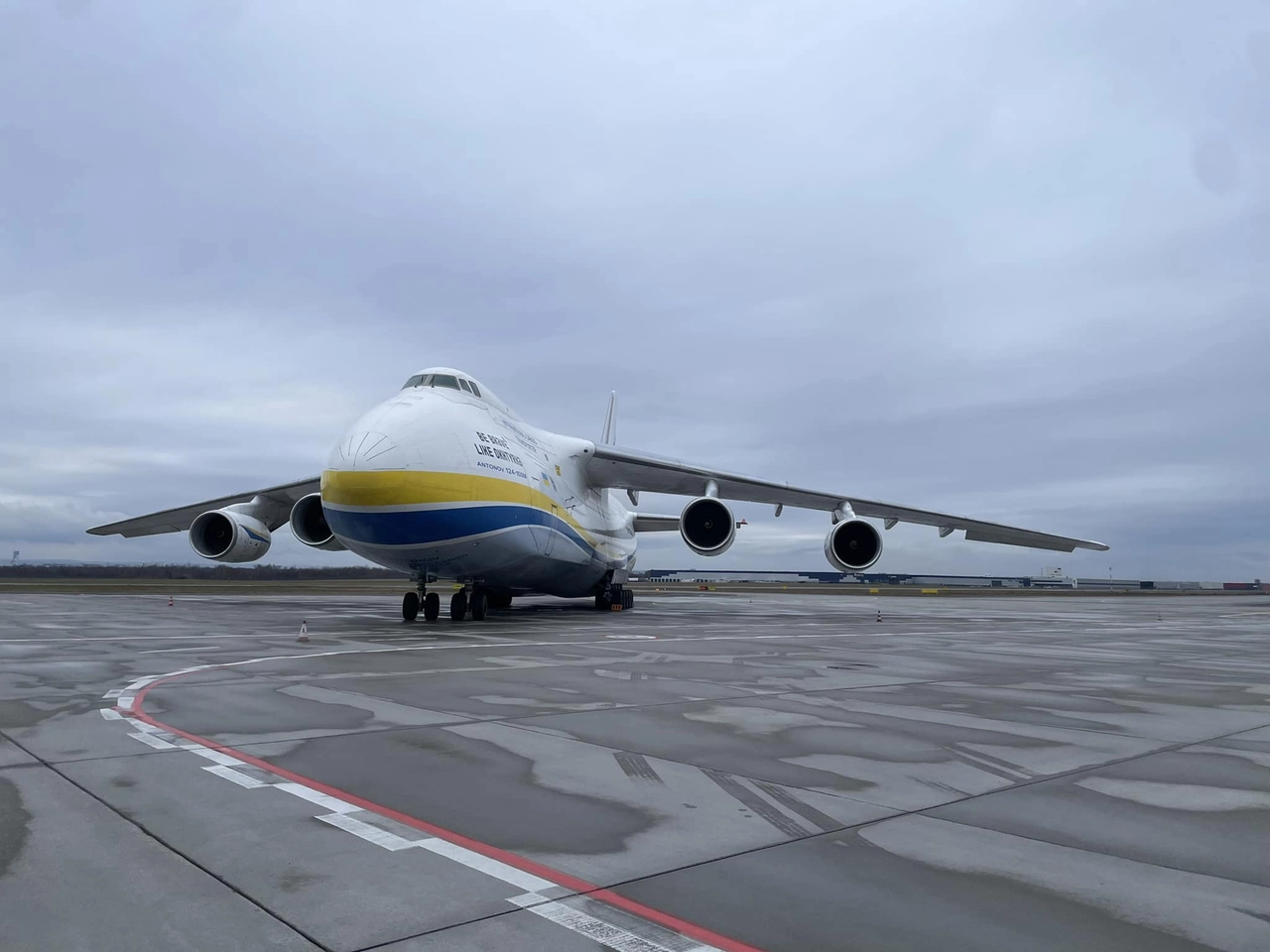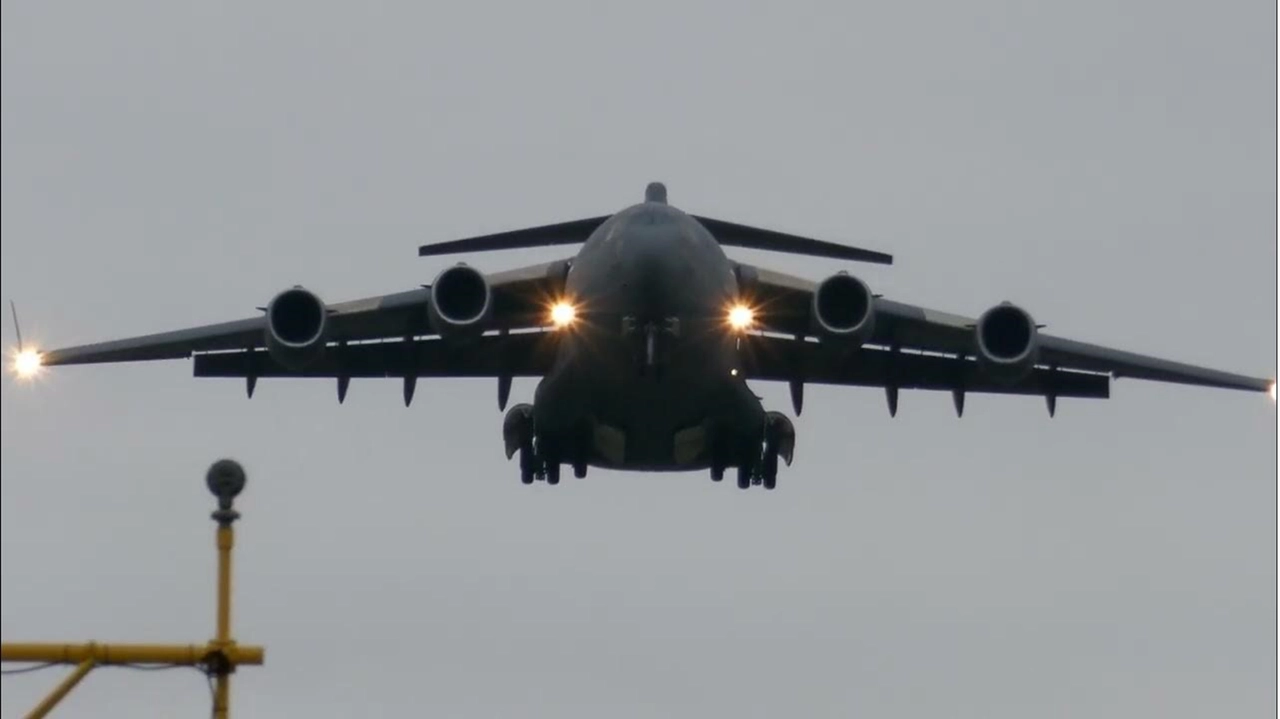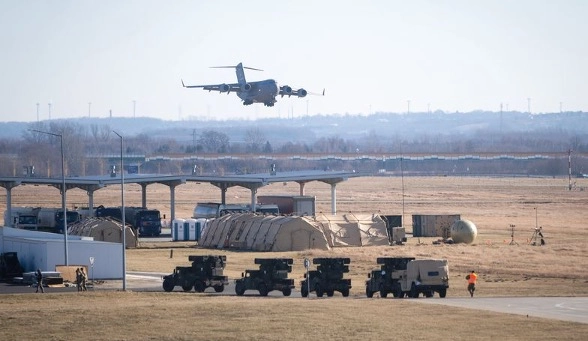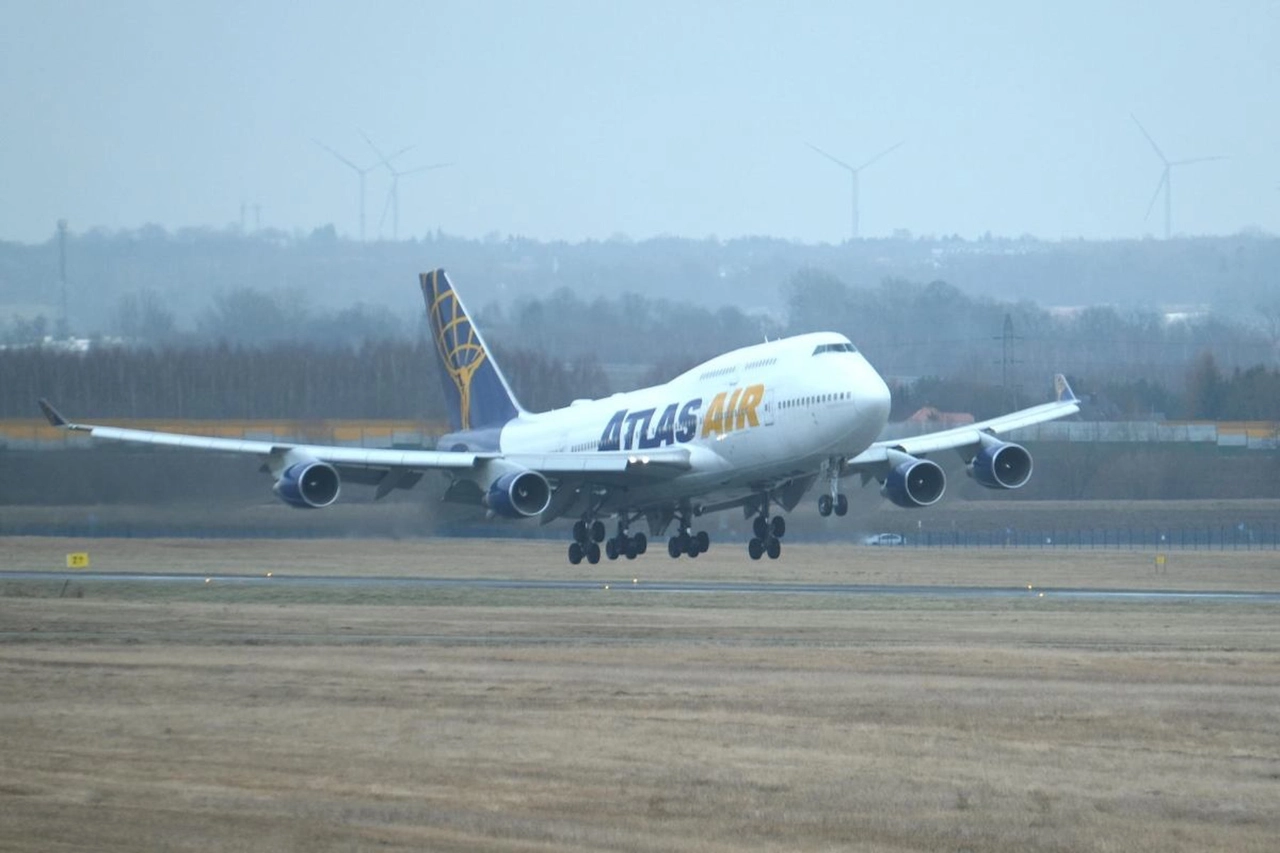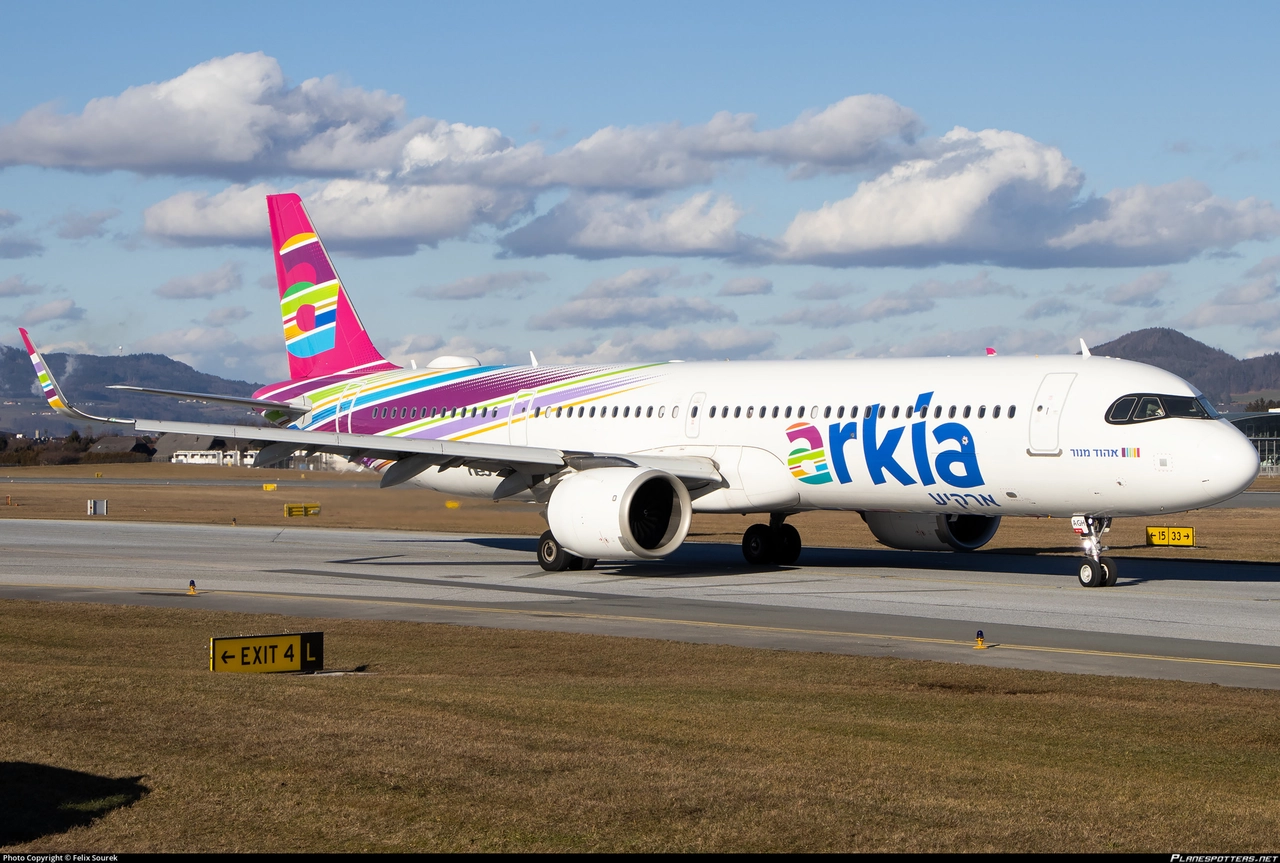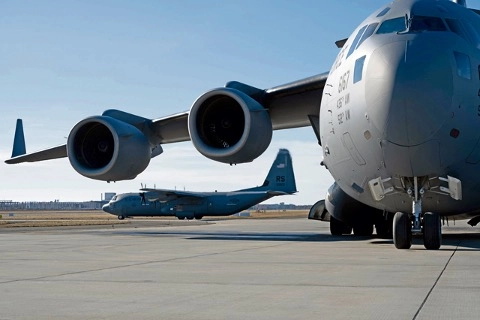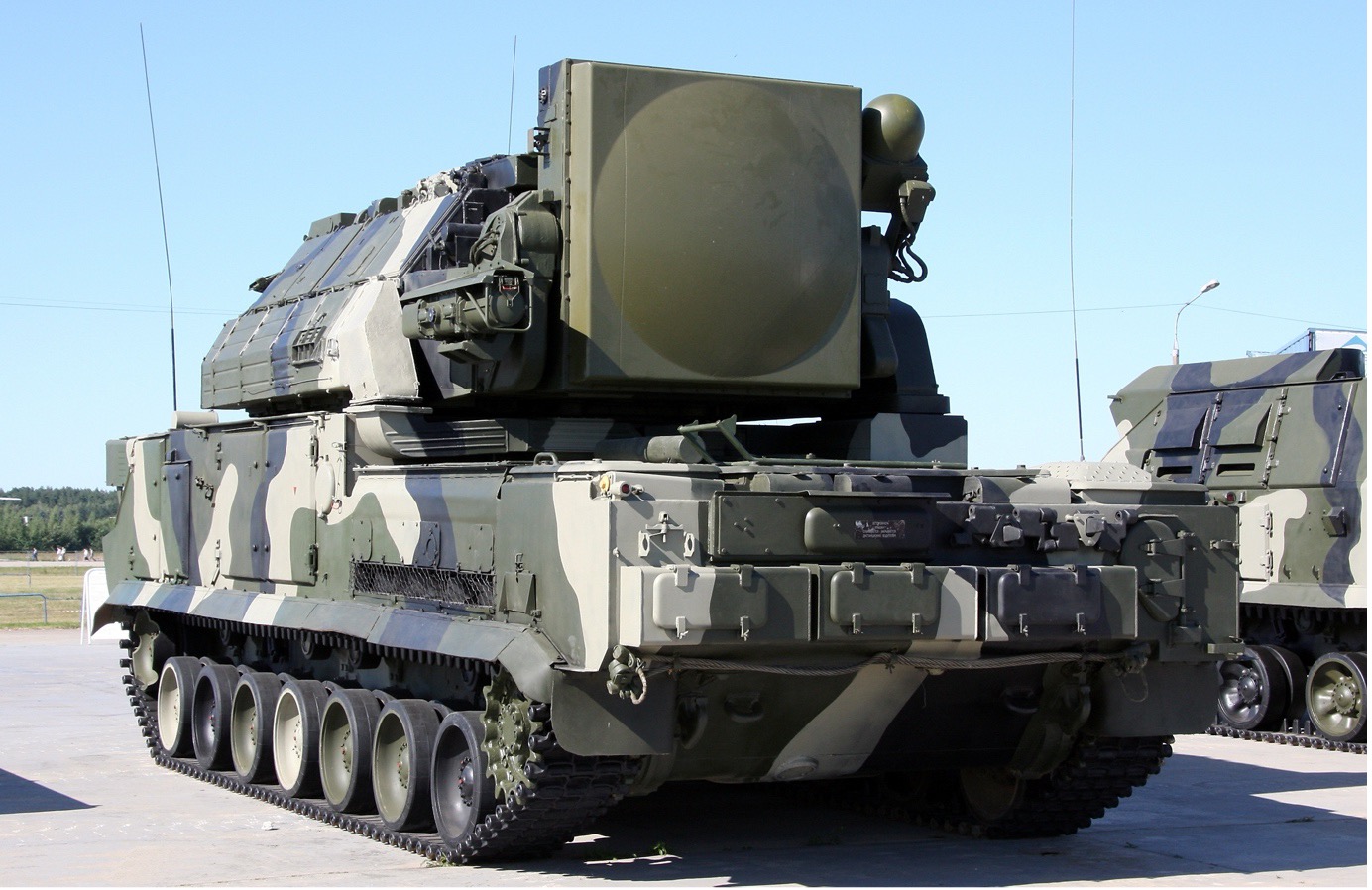Arrivals of heavy cargo planes, the majority of them military, have spiked in recent weeks in the eastern Polish airport of Rzeszów, NATO’s main air logistics hub for supplying the Armed Forces of Ukraine (AFU) with weapons and war-related supplies.
Total arrival and departure counts for aircraft of all types, averaging around 20-25 aircraft landed or launched every day at the start of the year, during March intensified by better than a third. On some peak days ground handlers at Rzeszów Airport – sometimes called Rzeszów-Jasionka or by its IATA code letters RZE [ICAO: EPRZ] – have had to hustle to handle as many as 40 arrivals or departures every 24 hours.
JOIN US ON TELEGRAM
Follow our coverage of the war on the @Kyivpost_official.
FlightAware graphic showing aircraft arrival and departure frequency at Rzeszów airport from Feb. 2022 through the present.
Kyiv Post researched this article by reviewing open-source air traffic and aircraft data published by the airport itself, by public-access flight tracker information platforms like Flightradar24 and FlightAware, and in some cases by research into individual traffic movements, and cross-checking with local observers.
Individual review of the types of military aircraft arriving at Rzeszów over the two weeks March 21-April 3, or civilian aircraft likely to carry military cargos during that time window point strongly to a US-led air logistics surge in support of the AFU, with substantial support from across NATO.

Shift in Ukrainian Attitudes Toward War Endurance as Belief in Russia’s Resources Grows
Antonov Airlines An-124 Ruslan heavy cargo plane spotted and photographed at Rzeszów airport by Polish plane-watcher Grzegorz Lemiechowicz. The aircraft flew to east Poland from Oslo, Norway and arrived at the NATO logistics hub at about 12:40 local time on March 24th. The Ukraine-owned and operated plane departed Rzeszów at about 14:20 (2:20 p.m.). Open-source flight records reviewed by Kyiv Post did not say where it was going next.
In that period, daily, based on Kyiv Post review of those open-source records, at least three and as many as nine cargo aircraft operated by a NATO-nation Air Force, or a major air cargo contractor with a long history of performing charter flights for the US military, have been landing at Rzeszów for close to a month.
On one of the busiest days, on March 24 (aside from more than a dozen civilian passenger flights and almost as many corporate jets or pilot trainers) Rzeszów’s air traffic control team and ground crew received and handled: a sleek British Royal Air Force A400M Airbus, a French Air Force A330, three hulking Boeing C-17A Globemaster III cargo jets (two Italian, one USAF), a pair of even bigger civilian 747-400 cargo jets owned by the longtime Pentagon contractor Atlas Air, a third 747-400 four-engine freighter operated by Atlas’ direct competitor National Airlines, and a Ukrainian An-124 Ruslan cargo jet, the world’s largest factory-produced cargo aircraft.
Kyiv Post screen grab of US Air Force Boeing C-17 Globemaster landing at Rzeszów-Jasionka airport. Image published on YouTube on Jan. 7, 2024, at https://www.youtube.com/watch?v=mUAQR2dS2ew
Reports by plane-spotters and Portuguese media reviewed by Kyiv Post point to a strong probability the Antonov was carrying Leopard 2A6 tanks donated by Lisbon to the Ukrainian military. Carriers flying into Rzeszów, among them the US Air Force (USAF) and Atlas Air, did not respond to a Kyiv Post request for comment on cargo carried or the freight’s ultimate destination(s).
Portuguese military official photograph of Leopard 2A6 tanks en route to Ukraine aboard a cargo aircraft. The interior appears to be that of a Ukraine-manufactured An-124 Ruslan transport jet. Image published on the Portugal Army X account on April 2.
The planes flew to Poland that day from Oslo, a British military facility near Portsmouth, from NATO trans-Atlantic hub Gander in Canada, a USAF base in Delaware, and USAF bases near the German cities of Wiesbaden and Ramstein. All those sites have served as transit points for arms or ammunition sent by NATO states to Ukraine in the past.
Most aircraft required about three hours on the ground in Rzeszów to get back into the air. Some were turned around in a little more than two. The first plane – one of the Atlas 747s – landed at about 8 a.m. All but one – an Italian Globemaster – was back in the air by 20:20 (8:20 p.m.).
US Air Force C5 Galaxy military cargo plane lands at Rzeszów airport, in eastern Poland, on Feb. 13, 2022. Image shot by Mateusz Wlodarczyk and published by NurPhoto on 14/06/2023.
Some Ukrainian milbloggers said recent progress by a Czech-led artillery ammunition coalition to find, purchase, and deliver munitions to the AFU, announced in early March and already fully financed a month later, was delivering small quantities of critically needed new supplies of 155mm shells to front lines, expedited to the AFU by an American-run air bridge.
According to anecdotal accounts posted on social media or messaged to Kyiv Post in early April, AFU troops fighting in the Avdiivka and Kreminne sectors report previous AFU tight restrictions on artillery shell expenditures had relaxed somewhat, and that for the first time in months, Ukrainian gunners again were being allowed to fire concentrations on Russian targets. Soldiers interviewed for this article said they didn’t know why commanders were releasing more shells to be fired.
NATO logisticians commonly estimate the weight of an 8-round standard pallet of 155mm shell at about 420 kg., depending on packing materials. According to freight forwarders an hour’s operation of a 747-400, before rush and special handling fees, is $6,000-8,000. According to some estimates, the operating cost of a C-17 is more than $100,000 per hour.
The freight aircraft confirmed to have landed on March 24 at Rzeszów would have, collectively, maxed out their overall carrying capacity at around 750 tons of air cargo. On average, over the two weeks received by Kyiv Post, the theoretical cargo capacity of the five or six military or military-associated planes typically landing at the air hub between 6 a.m. and 8 p.m. was probably 300-400 tons a day.
The US military’s most massive strategic airlift, the six-month transfer of troops and material to Saudi Arabia in 1991 following Iraqi invasion of Kuwait, saw heavy USAF cargo jets landing at Riyadh airport about every seven minutes to delivery 3,000 tons of military material 24/7.
Aside from the top priority artillery ammunition, according to recent news reports, AFU leadership is most desperate for Western deliveries of long-range precision-guided munitions (PGMs) and modern anti-aircraft missiles.
French major media in late March reported President Emmanuel Macron, as part of a Parisian pivot towards directly challenging Kremlin aggression, and toward supporting Ukraine, has begun negotiations with Gulf states to transfer some of their weaponry to Kyiv, particularly modern Caesar artillery pieces from Riyadh and advanced SCALP cruise missiles from the UAE.
Over the two weeks reviewed by Kyiv Post, Rzeszów Airport received a Malta-registered cargo 747 operated by Air Atlanta from Riyadh on March 26. French Air Force A330 aircraft normally used for passenger transport but with about a 35-ton cargo capacity flew into Rzeszów on March 21, 23 and 24, all from Châteauroux-Déols Air Base.
Boeing 747-400 cargo jet arrives at Rzeszów airport, in eastern Poland, on Feb. 8, 2022. The aircraft operated by the major air cargo company Atlas Air was part of a NATO build-up in east Poland prior to Russia’s full-scale invasion of Ukraine which began on Feb. 24, 2022. Photo by Patryk Ogorzałek / Agencja Wyborcza.pl.
Probably the most peculiar air traffic at Rzeszów noted by Kyiv Post over the two-week review period took place on March 1, during which a gaggle of two-engine jets flew to eastern Poland from Israel. Records listed no less than eight (A320s and A330s mixed) planes operated Cypriot Tus Air, Bulgarian Electra Airways and GullivAir airlines, and Israeli El Al, Arkia Airways and Israir as performing the flights.
This plane flew twice between Tel Aviv and Rzeszów on March 31. Open source records identify it by the tail number 4X-AGH Arkia - Israeli Airlines. The aircraft is an Airbus A321-251NX, a plane with a rated cargo capacity of 27 tons or 14 Europallets.
It took almost exactly 24 hours. One plane, the Arkia Airways aircraft identifier 4X-AGH flew between Tel Aviv and Rzeszów twice in one day. None of the companies had responded to a Kyiv Post request for comment as this article went to press.
On Friday morning, following the close time window reviewed in detail by Kyiv Post, two Air Atlas Air cargo 747s, and two Kalitta Air cargo 747s landed at Rzeszów. All had crossed the Atlantic after taking off in Dover, Delaware.
A Finnish Air Force C-295 Airbus turboprop arrived and then returned to Helsinki mid-morning, and a Luftwaffe Airbus 321 (probably loaded with officers and staff) arrived from Cologne and left a little later.
Then an Air Atlanta cargo 747 from Riyadh, Saudi Arabia landed. That was followed by a Royal Air Force Airbus 330 and a Canadian Air Force C-130. After lunch, yet another Kalitta charter 747-400 touched down, like the others at the end of an eight-and-half hour flight out of Dover.
A C-130J Super Hercules aircraft (side view) assigned to the 37th Airlift Squadron from Ramstein Air Base, Germany, taxis onto the runway at Rzeszów-Jasionka Airport, Poland, Feb. 13, 2022. Multiple aircraft deployed to transport U.S. Army cargo and passengers for the 82nd Airborne Division in support of Allies and partners in the region. (U.S. Air Force photo by Senior Airman Taylor Slater)
The workday at Rzeszów airport was only a bit over half-over. But from the flight data, it was clear that the NATO eastern logistical air hub was still busy.
You can also highlight the text and press Ctrl + Enter


